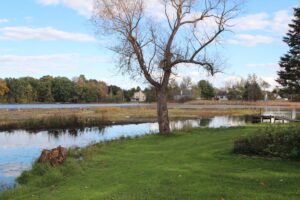By David Fleet
Editor
Atlas Twp.- On Oct. 18, the township board of trustees voted 5-0 to approve the disbandment of a special assessment district for Gale Lake residents.
A petition was distributed to the 24 residents on the lake and 13 property owners signed the petition to discontinue the SAD. Following a review by township attorney David Lattie, the collected funds will be returned.
Some of the homeowners will opt to continue to pay for the treatments on an individual base from Gaines Michigan-based Aquatic Nuisance Plant Control.
Lake resident, Chris Lange, who built a home on the lake in 1995 sought the disbandment of the SAD which was implemented five years ago.
Over that time the homeowners funded the spraying of the chemicals on the 16 acre private lake to control weed growth.
The spraying began in 2017, said Lange.
“I was not informed of what the consequences of adding chemicals to the lake were,” said Lange, who attended the meeting. “But over the past five years I’ve seen the consequences.”
Lange studied the chemicals and the impact on wildlife on the pond.
“Most notably there’s been a visible difference to the lake,” he said.
Lange said in the fall it had been just lily pads in front of his home, now known as a “muck island.” The chemicals killed the root system of the lily pads which hold down the organic material at the bottom of the lake.
“Now it’s all risen up,” he said. “So now, just 20 feet off shore we have this muck island which grows weeds, purple loosestrife (an aquatic invasive species) that we never had before. That’s the drawback (to chemical treatment) that changed the physical makeup of the pond. Behind that we’ve seen fish kills. When you kill the weeds it creates a weed mass that has to biodegrade, and uses oxygen. That suffocates aquatic life.”
Lange said by killing the weeds and taking the oxygen out of the water it creates more nutrients for next year’s weed growth.
“It’s just a downward spiral,” he said.
Nick Brookshire is the owner of Aquatic Nuisance Plant Control. The company, services about 60 bodies of water statewide including the Goodrich, Fenton and Lapeer mill ponds.
“Every lake or pond is different,” said Brookshire. “In the case of Gale Lake, parts are very shallow and no matter how much (chemical) you throw at it weeds are going to grow. If the lake was dredged deeper it could change.”
“Sprayng individually is not as effective, but it works,” he said. “But we understand the concerns of some of the lake residents.”
